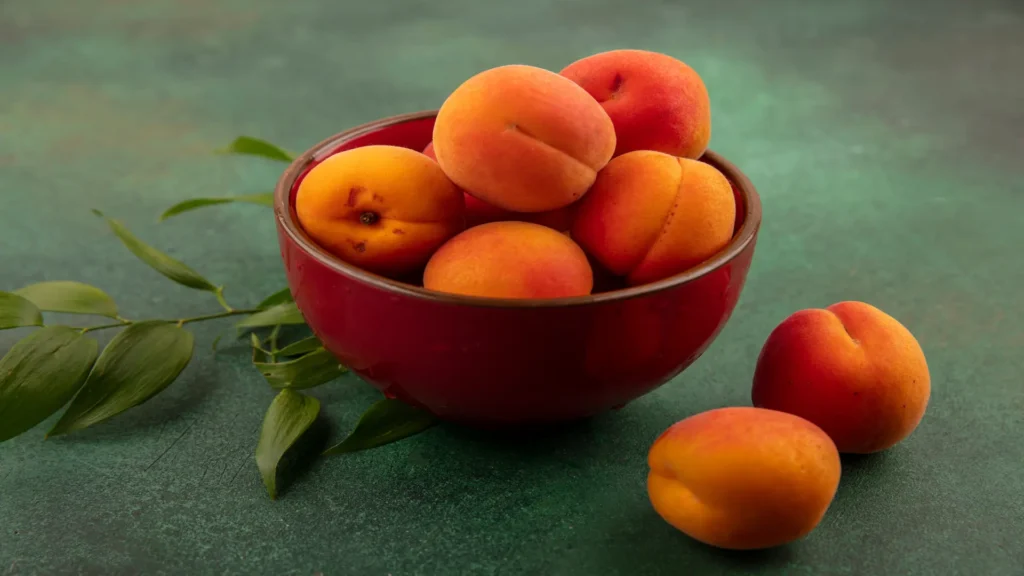As a loving pet owner, you want to provide your furry friend with a balanced and nutritious diet. While dogs primarily thrive on a diet of high-quality dog food, occasional treats can be a fun way to introduce variety and new flavors. Peaches, with their sweet and juicy flesh, may seem like an enticing treat for your canine companion. However, it’s essential to understand the potential benefits and risks associated with Can Dogs Eat Peaches before introducing them to your pet’s diet.

Table of Contents
Nutritional Benefits of Peaches for Dogs
Peaches are packed with essential nutrients that can contribute to a dog’s overall well-being. First and foremost, they are an excellent source of vitamins A and C, which play crucial roles in maintaining a healthy immune system, promoting good vision, and supporting cellular growth and repair.
Additionally, peaches are rich in fiber, which can aid in digestion and promote regular bowel movements. They also contain potassium, which is essential for proper muscle function, and various antioxidants that can help combat oxidative stress and support a healthy inflammatory response.
Potential Risks of Feeding Peaches to Dogs: Can Dogs Eat Peaches Safely?
While peaches do offer nutritional benefits, there are several potential risks to consider before offering them to your furry friend. Understanding Can Dogs Eat Peaches is essential to ensure your pet’s health and safety.
- Choking Hazard: Peach pits and large pieces of peach flesh can pose a choking hazard, especially for smaller dogs or those who tend to gulp their food without properly chewing.
- Gastrointestinal Issues: Like many fruits, peaches contain natural sugars that can cause digestive upset or diarrhea if consumed in excess, particularly for dogs with sensitive stomachs.
- Cyanide Poisoning: The pit or stone of the peach contains trace amounts of cyanide, a toxic compound that can be harmful if ingested in large quantities.
- Allergic Reactions: While rare, some dogs may exhibit allergic reactions to peaches, manifesting as skin irritation, itching, or respiratory issues.
How to Properly Prepare Peaches for Your Dog

If you decide to introduce peaches as an occasional treat for your dog, it’s crucial to prepare them correctly to minimize potential risks.
- Remove the Pit: Always remove the pit from the peach before offering it to your dog, as ingesting the pit can lead to gastrointestinal obstructions or cyanide poisoning.
- Slice or Mash: Cut the peach into small, bite-sized pieces or mash it into a puree to prevent choking hazards.
- Moderation is Key: Peaches should only be given as an occasional treat and in moderation, as their high sugar content can contribute to weight gain and other health issues if consumed in excess.
Understanding Peach Pits and Canine Safety
The pit or stone of a peach is particularly dangerous for dogs and should never be fed to them. These pits contain amygdalin, a compound that can release cyanide when metabolized. While the trace amounts of cyanide in a single peach pit are unlikely to cause severe poisoning in most dogs, ingesting multiple pits or pit fragments can lead to cyanide toxicity, which can be life-threatening.
Symptoms of cyanide poisoning in dogs may include vomiting, diarrhea, breathing difficulties, and even seizures or coma in severe cases. If you suspect your dog has ingested a peach pit or is exhibiting signs of poisoning, seek immediate veterinary attention.
Peach Varieties: Which Are Safe for Dogs?

Not all peach varieties are created equal when it comes to canine safety. While most common peach varieties are safe for dogs to consume in moderation, there are a few exceptions to be aware of.
- Nectarines: These smooth-skinned cousins of peaches are generally safe for dogs, but their pits should still be removed.
- Clingstone Peaches: These peaches, where the flesh clings tightly to the pit, may pose a higher risk of pit ingestion if not properly prepared.
- Exotic or Hybrid Varieties: As with any new fruit, it’s best to consult with your veterinarian before introducing exotic or hybrid peach varieties to your dog’s diet, as their nutritional composition and potential risks may differ.
Serving Size: How Much Peach Can a Dog Eat?
When it comes to serving peaches to your dog, moderation is key. While the exact serving size may vary based on your dog’s size, age, and overall diet, a general guideline is to limit peach treats to no more than 10% of your dog’s daily caloric intake.
For example, a small dog may only need a few slices or a tablespoon or two of mashed peach as a treat, while larger breeds may be able to handle a bit more. It’s always best to introduce new foods gradually and monitor your dog’s reaction before increasing the serving size.
Alternatives to Peaches for Dogs
If you’re looking for alternative fruit treats for your dog, there are several safe options to consider:
- Blueberries: Rich in antioxidants and low in calories, blueberries make a great treat for dogs.
- Apples: Apples are a good source of fiber and vitamins, but be sure to remove the seeds and core, as they can be toxic.
- Bananas: Packed with potassium and fiber, bananas can be a tasty and nutritious treat for dogs in moderation.
- Strawberries: These sweet berries are a good source of vitamin C and can be a refreshing treat on hot days.
- Sweetcorn: As discussed in our blog post “Can Dogs Eat Sweetcorn?“, this vegetable can be a safe and nutritious treat for dogs when properly prepared and fed in moderation.
Remember, while these fruits can be healthy treats, they should still be given in moderation and should never replace a balanced, complete dog food diet. Always consult your veterinarian if you have any doubts about Can Dogs Eat Peaches or any other food item for your pet.
Frequently Asked Questions
Can puppies eat peaches?
It's generally best to avoid giving peaches to puppies, as their developing digestive systems may have difficulty processing the sugar and fiber content. Wait until your puppy is at least 6 months old before introducing peach treats in small amounts.
Can dogs eat canned peaches?
Canned peaches are typically packed in heavy syrup, which can be high in added sugars and potentially harmful to dogs. Fresh or frozen peaches are a better option for your furry friend.
Can dogs eat peach yogurt or ice cream?
Dairy products like yogurt and ice cream may contain additional ingredients or sweeteners that can be harmful to dogs. It's best to stick to plain, fresh peaches as a treat.
Can peaches cause diarrhea in dogs?
Yes, if consumed in excess, the natural sugars and fiber in peaches can potentially lead to digestive upset or diarrhea in dogs, especially those with sensitive stomachs.
Summary
While peaches can be a tasty and nutritious occasional treat for dogs, it’s essential to approach them with caution and moderation. By removing the pit, cutting or mashing the flesh, and limiting portion sizes, you can safely incorporate peaches into your dog’s diet while minimizing potential risks.
Remember, treats should never replace a balanced, high-quality dog food diet tailored to your furry friend’s specific nutritional needs. Consult with your veterinarian if you have any concerns or questions about introducing new foods to your dog’s diet.
In addition to considering whether can dogs eat peaches, pet owners may also wonder about the suitability of peaches for their feline companions. The question of can cats eat peaches arises due to the similar dietary curiosity shared among pet lovers. However, unlike dogs, cats have more specific dietary needs, and peaches may not align with their nutritional requirements.




